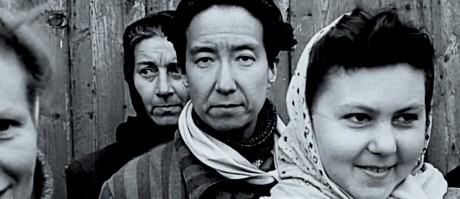


Magnus Gertten: Nelly & Nadine

“This is a film reel from April 28 1945…” beautiful material, black & white… of people arriving with the “white buses” to Malmö from German concentration camps. The third film by Swedish director Gertten digging into the 35mm footage bringing out of anonymity individuals as (title of the second one) “Every Face has a Name”. The director introduces the film with this first sentence of this paragraph. With a clear slowly put forward and precise voice. Stopping with the face of Nadine Hwang, one of the protagonists of this amazing love story about Nelly and Nadine, told by Sylvie Bianchi, the grandchild of Nelly.
That is one of the huge narrative successes of the film that Sylvie also becomes a protagonist with her own personality caught by the camera of Caroline Troedsson, who goes close to her face, when she step by step discovers the life of her beloved grandmother, whose life was never talked about at home for reasons that had to do with the love story betweeen Nelly and Nadine, two women. Sylvie’s mother did not like Nadine, it is being said.
Sylvie is such a wonderful person to have in the film. One thing is that she is the one who tells the story, another is that she is so much part of it: The camera catches her reluctance to open the big suitcase in the attic of the farm, her overcoming that obstacle, helped by her husband Christian, the farmer, her investigations in archives in Paris and Bruxelles, her listening to recordings of Nelly singing, her emotions watching the photos and the S8 films that was part of the huge written and visual inheritance from Nelly to her daughter ending up in the attic of a farm in Northern France. This farm (full of cats) and especially the fields are treated with love by the camera of Caroline Troedsson.
Throughout the whole film the editor Jesper Osmund combines the landscape images with quotes from the diaries that Nelly wrote, full of love and poetic sentences. But also combined with b/w landscape images shot by legendary Belgian documentarian Henri Storck (”Borinage”), often connected to the diary paragraphs from the Ravensbrück camp, where Nelly and Nadine met each other one christmas, when Nadine asked Nelly to sing ”Un Bel di Vedremo” from Madame Butterfly. Just one of the many scoops late in the film: The image of the harvesting machine in the fields with Christian driving it to the music of Puccini. Marvellous.
Nadine came from the camp to Malmö without knowing if Nelly was alive, as the latter was taken from Ravensbrück to Mauthausen. They met again and settled in Caracas Venezuela, where they had a fine social life with parties according to the many photos with work in a bank and at the French embassy. This is where Nadine becomes a photographer as Nelly calls her and where they decide to put together in writing their experiences from the camps and their love to each other. They tried to have it published, in vain. (After the film, why not make a book as well, suggestion from this reviewer…). The numerous photographs taken by Nadine brings together a portrait of Nelly.
It’s an understatement to say that the film is rich. As well as saying that it is extremely well put together. Elegant montage, a true flow, you are never bored, care for the detail, taking its time, no hurry and using the old editing trick: give the necessary information but leave a lot open to be discovered as the love story unfolds. I was moved, had some tears in the eyes, when Sylvie was moved.
PS. Languages, how lovely to hear Swedish, French, Spanish and English in the same film. PLEASE PLEASE don’t make stupid dubbed versions. Respect for languages!
Sweden, 2022, 92 mins.
And links to reviews of the two previous films in the trilogy:
”Every Face Has a Name” (2015)
http://www.filmkommentaren.dk/blog/blogpost/3084/
“Harbour of Hope” (2011)